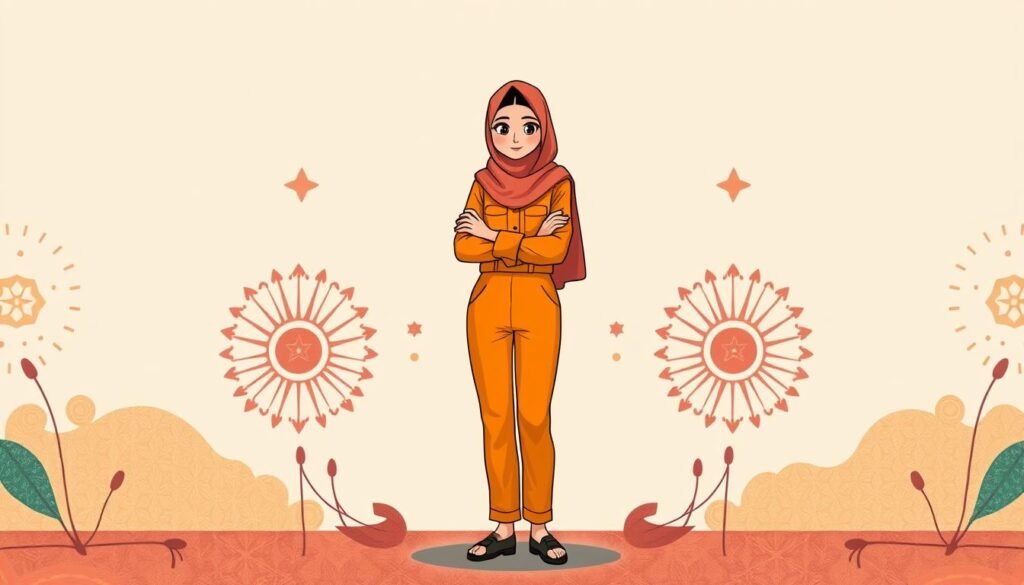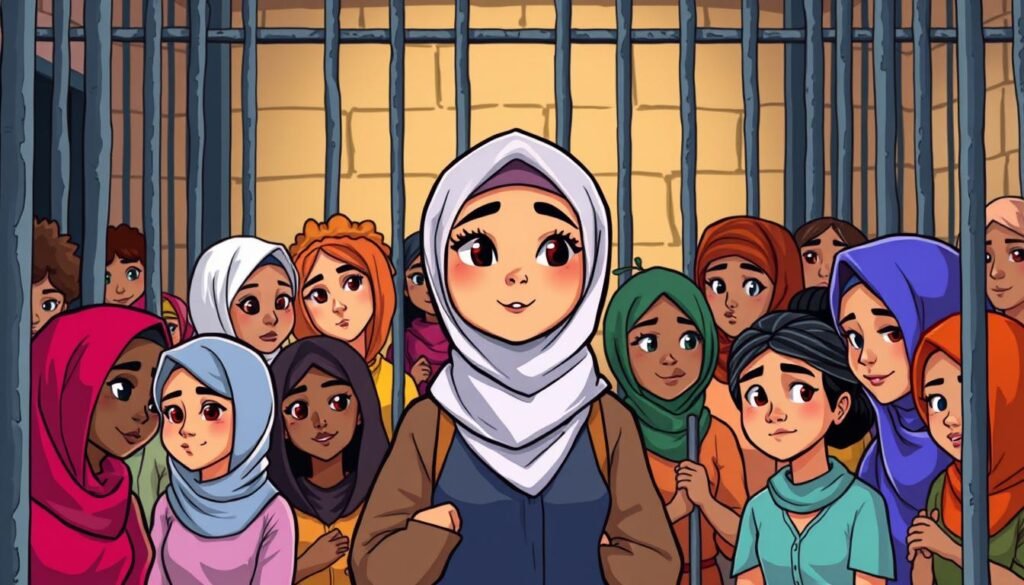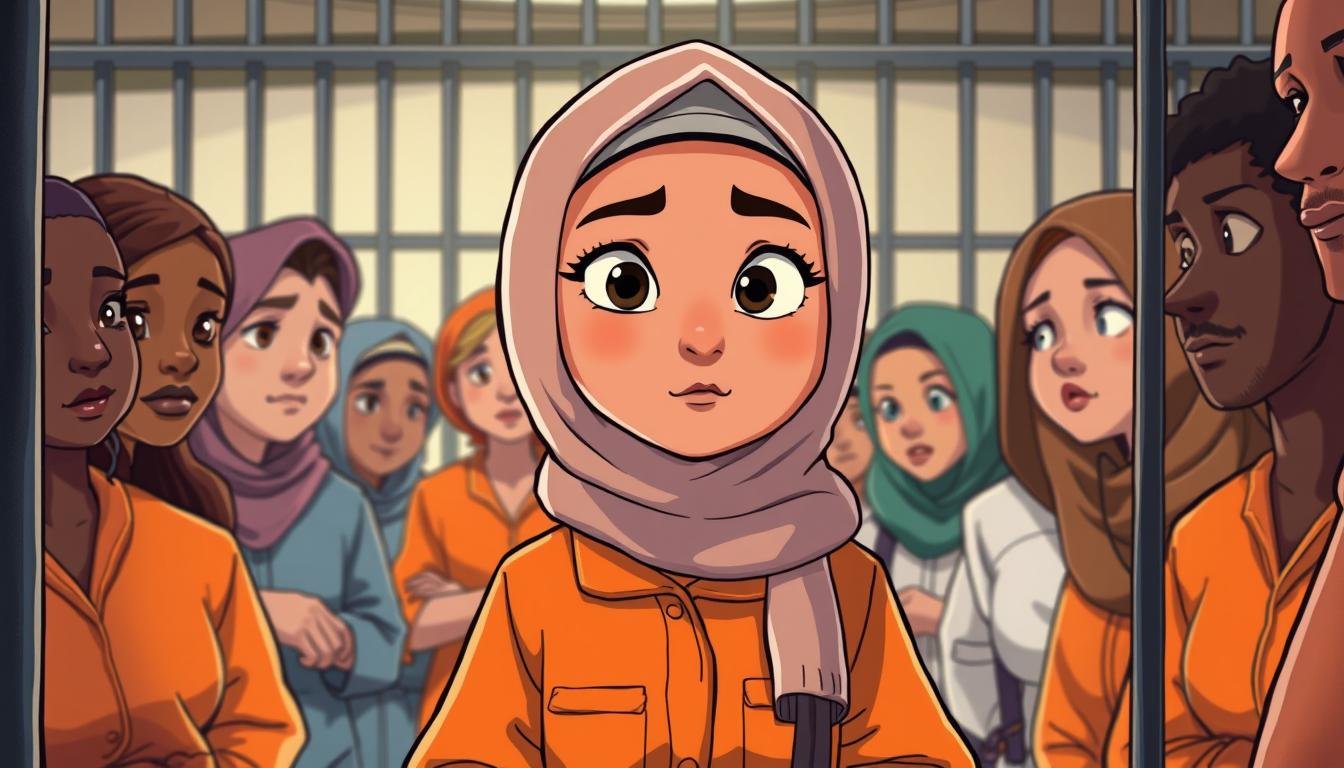What does it mean to be a Muslim woman in a popular Netflix series? “Orange Is The New Black” (OITNB) is known for its cultural diversity. The character of Alison Abdullah is a key example of Muslim identity in the show.
Alison is the only Muslim inmate in the series. Her story makes us think about how society views Muslim women in media. It also shows the complexity of her character in the show.
In OITNB’s seven seasons, characters explore their identities and experiences in prison. While Piper Chapman and Alex Vause are central, Alison adds a unique perspective. She shows the importance of Muslim representation and cultural diversity.
Alison’s presence in OITNB is significant. It raises questions about authenticity and awareness in storytelling. How do these portrayals change our views on faith, cultural diversity, and Muslim women’s lives? Let’s look closer at Alison’s character and the complexities of her identity.
Explore the impact of faithon in media to understand the broader dynamics at play in shows like OITNB.
Introducing Alison Abdullah: The Muslim Character in OITNB
Alison Abdullah was introduced in Season 4 of Orange Is The New Black. She became a key figure in the story. Played by Amanda Stephen, Alison is the only Muslim character in Litchfield Penitentiary.
Her presence highlights the life of a black Muslim woman in prison. It challenges common beliefs in society.
Alison wears a hijab in all 24 episodes. This shows her commitment to modesty and faith. She is a dedicated Muslim, often seen praying five times a day.
Her family adds depth to her story. She has a daughter named Farah and a husband named Hassan. This shows the challenges she faces as an inmate.
Alison is portrayed as strong and wise. Her actions are guided by a strong moral compass.
She faces conflicts, like one with her bunkmate Cindy. They bond over Scientology. In Season 5, she plays a key role in protests, fighting for justice and equality.
Alison’s story fights against stereotypes and discrimination. It encourages viewers to see beyond the hijab. Her story sparks a conversation about representation in media.
Understanding the Role of Religion in Alison’s Life
Alison Abdullah is a key figure in OITNB. She shows how hard it is to balance personal identity with religious duties. Her life is shaped by Islamic teachings, like wearing the hijab and praying daily.
These practices are a big part of who she is. They help us see what it’s like to be a Muslim in a place that’s not mostly Islamic.
Alison faces inner struggles with her faith. She tries to stay true to Islam while dealing with prison’s challenges. Her story shows how beliefs can change in tough times.
Being the first Muslim prisoner on the show, Alison carries a big responsibility. She shows what it’s like to be a Muslim woman in today’s media. Her story helps us understand identity and faith better.
Muslim Girl Orange Is The New Black?
The show “Orange Is the New Black” shows Muslim women in a different light. Alison Abdullah, played by Amanda Stephen, is the only Muslim inmate in Litchfield. Her story adds depth to the show, exploring faith, identity, and family.
Alison’s life is a deep dive into polygamy, a common practice for some Muslim men. Her relationship with Hassan shows the complexity of these practices. Alison wants a peaceful home, showing her true self beyond stereotypes.
When Hassan brings home his second wife, Sahar, Alison’s jealousy shows her humanity. This contrasts the usual view of Muslim women. Sahar, also wearing a hijab, adds to the show’s diversity, showing different sides of Muslim femininity.
Alison’s talks with her daughter, Farah, show the complex family ties. The show challenges stereotypes and focuses on Alison’s unique story. It encourages viewers to think differently about Muslim identities.

Alison’s Complex Family Dynamics
Alison Abdullah’s story in Orange Is The New Black shows the deep family ties shaped by culture and personal battles. Her marriage to Hassan brings big challenges, especially with polygamy. This shows the tough side of some Islamic traditions on today’s families.
Living with Polygamy
Being in a polygamous family changes Alison a lot. She feels jealous, unsure, and wants to be a good mom. These feelings show the hard parts of having many family ties. It’s hard to keep everyone happy and at peace.
Impact of Family Relationships on Alison’s Character
Alison’s family life deeply affects her story. Her talks with Hassan and her feelings with Sahar and Farah show her fight. It’s about wanting to be accepted and the big job of being a mom in a complex family. The show opens up a big about culture, showing the tough choices a woman faces between old ways and new ones.
Exploring Cultural Representation in OITNB
Orange Is the New Black shows a unique mix of cultures in a way that stands out. It brings together a wide range of characters, adding a lot to the story of inclusion. The show focuses on experiences often ignored in TV, especially those of Muslims.
Alison Abdullah is a key character in the show. In American media, Muslims are often shown in a bad light, as terrorists. But OITNB shows Alison’s life in a different way. It shows a side of her that many can relate to, breaking down stereotypes.

The show also celebrates differences in gender and sexual orientation. Characters like Ruby Rose add to the story, showing the value of diverse experiences. This helps viewers understand and feel empathy for others, breaking down barriers.
Alison’s story sheds light on Muslim experiences in a media world often biased. It also touches on bigger issues of diversity and inclusion. OITNB leads the way in showing the true beauty of human experiences through its diverse cast.
The Evolution of Alison’s Character Across Seasons
Alison Abdullah’s character grows a lot on “Orange Is The New Black.” This shows a great character evolution. At first, in Season 4, she starts as a new face in prison. Then, in Season 7, her story gets even deeper, showing her bond with other inmates.
From Season Four to Seven: Key Changes
In Season 4, Alison shines, showing her faith and adjusting to prison life. She keeps her faith strong, even in tough times. As the show goes on, especially in Season 5, she faces big questions about her beliefs.
Her journey includes becoming more active in prison issues. This leads to strong bonds, like with Cindy Hayes. Her story is full of growth and new connections.
Highlighting Significant Episodes
Some episodes really show how Alison changes and grows. Her talks with her daughter, Farah, add to her story. Her feelings about her husband’s second wife, Sahar, also show her complexity.
Her views on her religion change, like when she pierces her ears. This shows her journey to find herself in Orange Is The New Black. To see more about her growth, check out Season 4 and her new friends.
Personality Traits: A Deeper Look at Alison Abdullah
Alison Abdullah is a standout in Orange is the New Black. Her intelligence and humor make her relatable and fun to watch. She shows sensitivity and moral values, reflecting feminist ideals.
Alison’s parenting style shows her commitment to gender equality. She wants her kids to be independent. This approach makes her a compassionate figure among inmates.
Alison faces many challenges in the series. These struggles show her resilience and determination. Her interactions with others show her strong advocacy for justice.
These traits make Alison a powerful symbol of modern femininity. She shows how femininity can be strong and culturally rich.
The Significance of the Hijab in Alison’s Identity
The hijab is a big part of Alison’s life. It shows her identity as a Muslim woman. This piece of clothing is more than just fabric; it shapes how she meets people and how they see her.
In prison, the hijab can get different reactions. People might see it as a sign of her faith or culture. This shows how society views cultural symbols and religious practices.
Alison’s story shows her deep connection with her hijab. Sometimes, it shows her strength and faith. Other times, it shows her vulnerability when she takes it off.
Her choices with the hijab talk about identity, power, and freedom. The hijab in her story shows the battle between personal choice and what society expects. It shows how complex cultural identity can be.
Thematic Elements: Feminism and Identity in OITNB
Orange Is The New Black is a standout in TV today. It dives deep into feminism and identity. Alison Abdullah’s story shows how personal and political worlds meet. She faces the tough life of a Muslim woman in a mostly non-Muslim prison.
Her journey shows the power of self-definition and empowerment. This is especially true in tough places.
The show’s first five seasons offer deep insights into identity. Researchers have found that OITNB touches on big debates about race and gender. Alison’s story is a key part of understanding feminism today.
Alison’s character is rich and complex. The research looks at race, gender, and sexual orientation. These themes show how identity is complex in OITNB. They also shed light on racial issues in the US.
Watching Alison’s story makes us think differently about identity and feminism. It shows how important OITNB is in today’s media.
FAQ
What role does Alison Abdullah play in "Orange Is The New Black"?
How does religion impact Alison’s character development?
In what ways does Alison challenge stereotypes associated with Muslim women?
What are some key themes related to family dynamics in Alison’s story?
How does "Orange Is The New Black" represent cultural diversity beyond Alison’s character?
Can you summarize the evolution of Alison’s character across the seasons?
What personality traits define Alison Abdullah’s character?
What is the significance of the hijab in Alison’s identity?
How do themes of feminism and identity manifest in Alison’s narrative?

Embracing Faith, One Insight at a Time!
The teachings of the Quran have always guided my path. With a deep passion for Islamic knowledge, I strive to blend the wisdom of tradition with the relevance of today, making the timeless messages of Islam accessible and meaningful for everyone.
Muslim Culture Hub is my platform to share historical insights and thought-provoking articles, exploring both well-known and lesser-discussed aspects of Islamic culture and beliefs. My mission is to create an inclusive online space where everyone can learn, strengthen their faith, and connect with the profound message of Islam.
Join the journey!
May peace be upon you.








